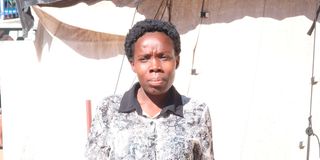When sickle cell disease is attributed to witchcraft

Susan Jebuto during the interview at Homa Bay County Teaching and Referral Hospital on June 21. She was diagnosed with sickle cell disease at the age of seven.
What you need to know:
- Doctors in the county say that some residents associate the disease to witchcraft and that the misconception is still widely held in the community.
- This has led to most patients, especially children, dying, as parents opt to seek spiritual intervention instead of visiting hospitals for medical care.
Growing up in Mbita, Homa Bay County, Susan Jebuto believed that her poor health and frequent illness was caused by bad omen. Her parents were told that her health condition was a result of witchcraft and evil spirits, and they would take her to different traditional and religious leaders for spiritual intervention.
Susan, 31, says her parents gave her traditional medicine and herbs believing that she would get better.
But unknown to them, she was suffering from sickle cell disease, a genetic blood disorder in which red blood cells, usually circular in shape, assume a sickle shape, leading to various complications including pain, anaemia and organ damage due to restricted blood flow.
"I am the third child in our family, but I would get sick more often than my siblings. As a child, I did not know what was happening to my body and I kept wondering why my siblings were not falling sick," she says.
She was diagnosed with sickle cell anaemia at the age of seven. It would, however, take another eight years for her to understand her health condition and how to manage it
"I learned what triggers the condition to worsen in the body and ways of overcoming the challenges. Learning about the disease has made me live a normal life," she says.
Susan attributes her success to modern medicine and turning a deaf ear to myths that some communities still hold about sickle cell.
In the same county, Ms Penesa Okomo, whose child has sickle cell, was told that the little one had been bewitched. Her child would often complain of pain in the limbs and stomach. She says her neighbours advised her to use traditional medicine. "I would give her herbal medicine whenever she complained of stomach or joint pains without knowing that I was worsening her condition,” she says.
Doctors in the county say that some residents associate the disease to witchcraft and that the misconception is still widely held in the community.
This has led to most patients, especially children, dying, as parents opt to seek spiritual intervention instead of visiting hospitals for medical care.
Flu and pneumonia
According to Medecins Sans Frontieres (Doctors without Borders) Project Coordinator Bright Muhkuna, lack of information about the condition is one of the challenges that doctors in the county have to deal with when attending to sickle cell patients.
Mr Mukhuna said some patients are taken to hospital when it is too late.
"We provide screening and management services of non-communicable diseases as well as comprehensive care for patients. We are, however, concerned about delays being witnessed in bringing sickle cell patients to hospital," he said.
Mr Mukhuna explained that children with sickle cell are more likely to have infections such as flu, meningitis and pneumonia.
"The disease can also affect blood vessels in the eye, leading to long term damage. It can a lead to acute chest syndrome like pneumonia, which is characterised by chest pain, coughing, breathing difficulties and fever," he says.
Sickle cell disease can clog blood flow to the brain and cause stroke, which can result in lifelong disabilities. MSF has been working with community health promoters (CHP) in the county to strengthen health care services.
According to Mr Mukhuna, some CHPs give them feedback that some patients with sickle cell do not want to use modern medicine.
He attributed this to stigma, saying some people do not understand how the disease is acquired and associate it with outdated beliefs.
"We have started training CHPs on how to address cases of sickle cell in the community. We want them to encourage people to go for screening and demystify all myths associated with the condition," Mr Mukhuna said.
Dr Amos Dulo, director of curative and rehabilitative health in Homa Bay, said the county bears the greatest burden of sickle cell, attributing it to proximity to Lake Victoria.
The Department of Health in the county does not have exact figures of the number of patients in the region, but Dr Dulo said Homa Bay could be the leading county in sickle cell prevalence. He described sickle cell as a neglected disease, one which has not received the focus it deserves. "We estimate that 12 per cent of the population carries the trait. This is a big number and the disease deserves to be given more attention," Dr Dulo said..
The official added that one of the main challenges faced by sickle cell patients is lack of access to medication. He said many people in the county have enrolled for the National Hospital Insurance Fund (NHIF), which does not take care of routine medical check-ups for sick sell patients.
"The new medical cover will solve the challenge. There is a lot in the new cover that will address the shortcomings," Dr Dulo said.
There is also a push to categorise sickle cell as a form of disability.
If it sails through, it will enable people with the medical condition to have social benefits that are enjoyed by people with disabilities.

